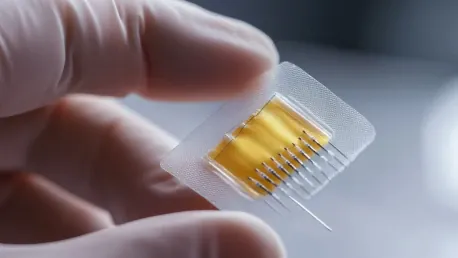Imagine a world where getting vaccinated no longer means facing a needle and syringe, but instead, involves a simple patch applied to the skin. This prospect is rapidly becoming a reality thanks to the innovative work of the University of Queensland (UQ) and Brisbane-based biotech company Vaxxas. Their collaborative efforts on a patch-based mRNA vaccine for COVID-19 have earned them international recognition. They have been awarded one of the prestigious Concept Stage prizes in the US$50 million Biomedical Advanced Research and Development Authority (BARDA) Patch Forward Prize. This award highlights their promising advancements in microneedle patch technology and its application in administering mRNA vaccines for COVID-19, seasonal influenza, and pandemic influenza.
The HD-MAP Technology and Its Advantages
A New Approach to Vaccine Delivery
UQ and Vaxxas have developed a high-density microarray patch (HD-MAP) that stands to transform how vaccines are administered. The HD-MAP technology features a small patch embedded with thousands of tiny microprojections coated with a dried vaccine dose. When the patch is applied to the skin, these microprojections penetrate the outer layers to deliver the vaccine directly to the immune cells underneath. This innovative approach offers multiple advantages over traditional syringe-based methods. One of the most significant benefits is the reduced need for cold-chain storage, which is particularly crucial for the stability of mRNA vaccines. This technology not only enhances shelf life but also reduces transportation and storage complexities, making vaccine distribution more cost-effective and accessible.
The potential for self-administration is another game-changer. Using an easy-to-use applicator, individuals could apply the patch themselves without the need for trained healthcare professionals, simplifying the entire vaccination process. This feature is particularly beneficial in large-scale vaccination campaigns where healthcare resources are limited. It also minimizes the risk of needle-stick injuries and addresses needle phobia, which can deter individuals from getting vaccinated. The HD-MAP could make a significant impact on global vaccination efforts, particularly in regions that lack robust healthcare infrastructure.
Global Implications and Benefits
Professor Timothy Mercer, Director of UQ BASE, emphasized that HD-MAP technology could greatly improve access to mRNA vaccines on a global scale, especially in lower middle-income countries that struggle with limited cold-chain infrastructure. The ability to store and transport these vaccines at higher temperatures without compromising their efficacy could revolutionize vaccine distribution in remote and underserved areas. This technological leap could therefore play a critical role in bridging the gap between vaccine availability and accessibility, ensuring that more people are protected against infectious diseases.
Additionally, the thermostability of mRNA vaccines on the Vaxxas patch can help in preparation for future pandemics by streamlining stockpiling and rapid distribution. This enhances the readiness of health systems worldwide to respond swiftly to emerging health threats. By reducing logistical hurdles and increasing the ease of administration, HD-MAP technology could become a cornerstone in global public health strategies, making vaccines more readily available in areas that need them the most.
Commercialization and Future Prospects
Vaxxas’ Commercial Ambitions
Founded as a start-up from UQ and later commercialized by UniQuest, Vaxxas aims to enhance the performance of vaccines targeting infectious diseases and oncology through its HD-MAP technology. Dr. Deborah Pascoe, Senior Vice President of Pipeline Development at Vaxxas, noted that receiving the BARDA Patch Forward Prize underscores the value of strategic partnerships in advancing mRNA research and manufacturing. This financial boost will aid Vaxxas in accelerating their HD-MAP technology toward preclinical studies. The success of these studies could pave the way for clinical trials and eventual commercialization, bringing their mRNA COVID-19 vaccine candidate closer to market readiness.
The innovative microneedle patch technology not only holds promise for COVID-19 vaccines but also for other mRNA vaccines against a myriad of infectious diseases and potentially even therapeutic vaccines for cancer. The ability to customize the HD-MAP for different vaccines offers a versatile platform that can adapt to various public health needs. This flexibility could position Vaxxas as a leader in next-generation vaccine technology, driving the future of vaccine administration toward more efficient and accessible methods.
Recognition and Future Development
The BARDA Patch Forward Prize, backed by the U.S. Department of Health and Human Services, serves as a powerful incentive for continued innovation in this field. The Concept Stage prize is just the beginning, with submissions for the Preclinical and Clinical stages accepted through 2025-2026. This ongoing support highlights the critical importance of developing new vaccine delivery systems that can address current limitations. UQ and Vaxxas’ work exemplifies the innovative potential within the biotech sector to tackle global health challenges.
This recognition not only brings prestige but also practical value by providing resources to advance their technology. The partnership between UQ and Vaxxas showcases how academic institutions and industry can collaborate to drive scientific breakthroughs that have far-reaching implications. The advancements in HD-MAP technology could set new benchmarks in vaccine delivery, particularly in challenging environments with logistical constraints. The ultimate goal is to create a more resilient and equitable global health system capable of responding to current and future pandemics efficiently.
The Road Ahead
Preparing for Future Pandemics
Imagine a world where getting vaccinated means no more needles and syringes, but rather a small patch on your skin. Thanks to the creative minds at the University of Queensland (UQ) and the Brisbane-based biotech company Vaxxas, this vision is on the brink of realization. Their joint project on a patch-based mRNA vaccine for COVID-19 is catching the world’s attention. Recently, they were awarded one of the notable Concept Stage prizes in the US$50 million Biomedical Advanced Research and Development Authority (BARDA) Patch Forward Prize. This prize underscores their significant progress in microneedle patch technology and its promising application for delivering mRNA vaccines for COVID-19, seasonal flu, and potential flu pandemics. The innovative approach aims to simplify vaccine administration, potentially increasing accessibility and acceptance among the public, and represents a breakthrough in the way vaccinations might be conducted in the near future, making the process easier and less daunting for everyone.









